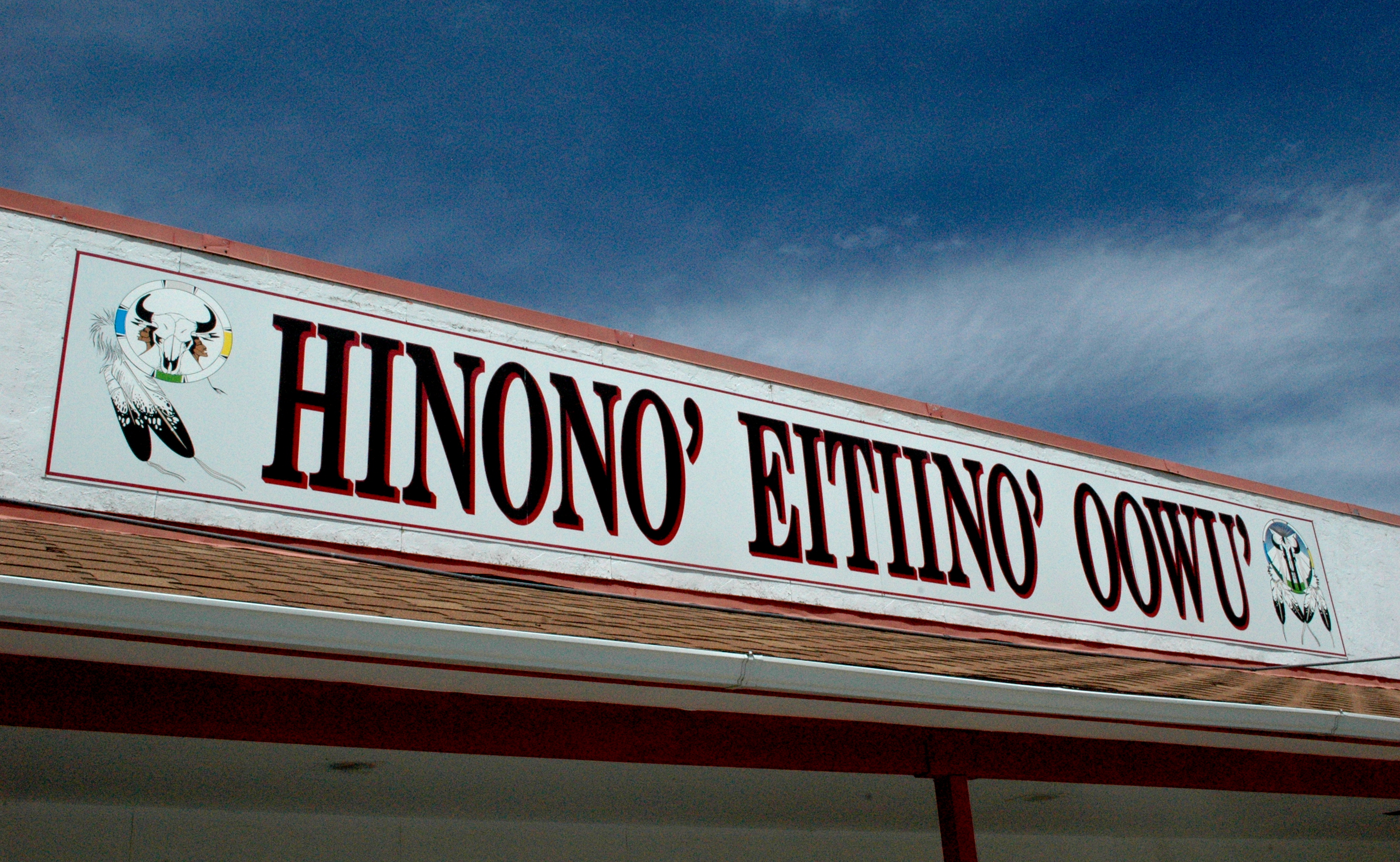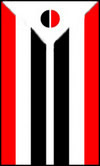Child and Daycare
"Most Wanted Phrases"

This page was produced in collaboration with Arapaho-speaking pre-school teachers and their assistants, who discussed the phrases they use most often, and the phrases they need to know the most.
When two possibilities are given, they both mean exactly the same thing, and are just examples of minor dialect differences in pronunciation. After each "most wanted phrase" are examples of variations of the phrase that you might also use.
![]() Heeteenebín heiteh’éího’ (respect them) = Be nice to your friends
Heeteenebín heiteh’éího’ (respect them) = Be nice to your friends
or Niiteheibín heiteh’éího’ (help them) = Be nice to your friends
![]() Nehéíc or nehéícoo
= Come here
Nehéíc or nehéícoo
= Come here
![]() Cihcíitei
= Come in
Cihcíitei
= Come in
![]() Niisi3ei’i (means ‘work!’) = Do your work
Niisi3ei’i (means ‘work!’) = Do your work
or
![]() Níístii (means ‘do it!’) = Do your work
Níístii (means ‘do it!’) = Do your work
![]() Neniisi3ei'i-noo = I'm working
Neniisi3ei'i-noo = I'm working
![]() Neniisi3ei'i-t = He/she is working
Neniisi3ei'i-t = He/she is working
![]() Neniisi3ei'i-3i' = They are working
Neniisi3ei'i-3i' = They are working
![]() Neniisi3ei'i-no'
= We are working
Neniisi3ei'i-no'
= We are working
![]() Ciibéhnihi’kóóhu
= Don’t run
Ciibéhnihi’kóóhu
= Don’t run
![]() Nii’óóke’
= Good morning
Nii’óóke’
= Good morning
![]() Hiisibí
= Lay down
Hiisibí
= Lay down
![]() Niiteiyookuu or niiteiyeekuu = Line up
Niiteiyookuu or niiteiyeekuu = Line up
![]() Neniiteiyookuu-3i' (or
Neniiteiyookuu-3i' (or
![]() neniiteiyeekuu-3i') = They are lined up
neniiteiyeekuu-3i') = They are lined up
![]() Neniiteiyookuu-no' (or
Neniiteiyookuu-no' (or
![]() neniiteiyeekuu-no') = We are lined up
neniiteiyeekuu-no') = We are lined up
![]() Ceh’é3tii = Listen
Ceh’é3tii = Listen
![]() Ceeh'e3tii-noo = I'm listening
Ceeh'e3tii-noo = I'm listening
![]() Ceeh'e3tii-no' = We're listening
Ceeh'e3tii-no' = We're listening
![]() Ceeh'e3tii-t = He/she is listening
Ceeh'e3tii-t = He/she is listening
![]() Ceeh'e3tii-3i'
= They are listening
Ceeh'e3tii-3i'
= They are listening
![]() (Cih)noohow-u or (cih)néí’oohow-u = Look at me
(Cih)noohow-u or (cih)néí’oohow-u = Look at me
![]() Cihnoohob-ei'ee or
Cihnoohob-ei'ee or
![]() cihnei'oohob-ei'ee = Look at us
cihnei'oohob-ei'ee = Look at us
![]() Noohow-un or
Noohow-un or
![]() noohow-unee
= Look at him/her/them
noohow-unee
= Look at him/her/them
![]() Ho-tousíhi’ = What’s your name?
Ho-tousíhi’ = What’s your name?
![]() Tousihi'
= What's his/her name?
Tousihi'
= What's his/her name?
![]() Ne-niisih’íít = My name
Ne-niisih’íít = My name
![]() He-niisih'iit = Your name
He-niisih'iit = Your name
![]() Hi-niisih'iit
= His/her name
Hi-niisih'iit
= His/her name
![]() Ceenóku
= Sit down
Ceenóku
= Sit down
![]() Ko’éíci = Sit in a circle
Ko’éíci = Sit in a circle
![]() Koo'eici-3i' = They are sitting in a circle
Koo'eici-3i' = They are sitting in a circle
![]() Koo'eici-no'
= We are sitting in a circle
Koo'eici-no'
= We are sitting in a circle
![]() Téiitoonóku = Sit still
Téiitoonóku = Sit still
![]() Teneiitoonoku-3i' = They are sitting still
Teneiitoonoku-3i' = They are sitting still
![]() Teneiitoonoku-no' = We are sitting still
Teneiitoonoku-no' = We are sitting still
![]() Teneiitoonoku-t = He/she is sitting still
Teneiitoonoku-t = He/she is sitting still
![]() Teneiitoonoku-noo
= I am sitting still
Teneiitoonoku-noo
= I am sitting still
![]() Kooxo'usee-noo = Slow down
Kooxo'usee-noo = Slow down
Koxo’usee (means 'walk slow') = I have slowed down
![]() Kooxo'usee-t
= He/she has slowed down
Kooxo'usee-t
= He/she has slowed down
![]() Bíh’inkuutii = Turn off the lights
Bíh’inkuutii = Turn off the lights
![]() Biih'inkuutii-noo = I have turned off the lights
Biih'inkuutii-noo = I have turned off the lights
![]() Biih'inkuutii-t
= He/she has turned off the lights
Biih'inkuutii-t
= He/she has turned off the lights
![]() Noh’óéseikuutii = Turn on the lights
Noh’óéseikuutii = Turn on the lights
![]() Nooh'oeseikuutii-noo = I have turned on the lights
Nooh'oeseikuutii-noo = I have turned on the lights
![]() Nooh'oeseikuutii-t
= He/she has turned on the lights
Nooh'oeseikuutii-t
= He/she has turned on the lights
![]() Cebísee = Walk
Cebísee = Walk
![]() Ceebisee-noo = I'm walking
Ceebisee-noo = I'm walking
![]() Ceebisee-t = He/she is walking
Ceebisee-t = He/she is walking
![]() Ceeb(i)see-3i' = They are walking
Ceeb(i)see-3i' = They are walking
![]() Ceeb(i)see-no'
= We are walking
Ceeb(i)see-no'
= We are walking
![]() Tou’óuu3 = What day is it?
Tou’óuu3 = What day is it?
![]() Coowo’óó’ (means 'it [weekend] is past') = Monday
Coowo’óó’ (means 'it [weekend] is past') = Monday
![]() Niis nonóóke’ (means 'second day') = Tuesday
Niis nonóóke’ (means 'second day') = Tuesday
![]() Nees nonóóke’ (means 'third day') = Wednesday
Nees nonóóke’ (means 'third day') = Wednesday
![]() Yein nonóóke’ (means 'fouth day') = Thursday
Yein nonóóke’ (means 'fouth day') = Thursday
![]() Neh’einíísi’ or
Neh’einíísi’ or
![]() neh’eheiníísi’ (means 'butchering day') = Friday
neh’eheiníísi’ (means 'butchering day') = Friday
![]() Hoxóbetiiníísi’ (means 'rations day') = Saturday
Hoxóbetiiníísi’ (means 'rations day') = Saturday
![]() Béteeníísi’ (means 'holy day') = Sunday
Béteeníísi’ (means 'holy day') = Sunday
![]() Tóusoo cé’e3í’ = What is it like outside?
Tóusoo cé’e3í’ = What is it like outside?
![]() Heniinoonóe’ti’ = Cloudy
Heniinoonóe’ti’ = Cloudy
![]() Tooyo3óó’ = Cold
Tooyo3óó’ = Cold
![]() Heesítee’ = Hot
Heesítee’ = Hot
![]() Honoosóó’ or
Honoosóó’ or
![]() honoosóóti’ = Raining
honoosóóti’ = Raining
![]() Nooh’óuute’ = Sunny
Nooh’óuute’ = Sunny
![]() Beneecí’ = Snowing
Beneecí’ = Snowing
![]() Heeséíse’
= Windy
Heeséíse’
= Windy
Koonéeni’ííni or kooníini'ííni = Are things good?
![]() Hee(m)/ ‘oo(f) néeni’ííni or níini'ííni = Yes, things are good
Hee(m)/ ‘oo(f) néeni’ííni or níini'ííni = Yes, things are good
![]() Hiiko, hoowniini'iini or hoowneeni'iini
= No, things are not good
Hiiko, hoowniini'iini or hoowneeni'iini
= No, things are not good
![]() Heitóustoo = What are you doing?
Heitóustoo = What are you doing?
![]() Heitoustoo-be = What are you (plural) doing?
Heitoustoo-be = What are you (plural) doing?
![]() Hiitoustoo = What is he/she doing?
Hiitoustoo = What is he/she doing?
![]() Hiitoustoo-no'
= What are they doing?
Hiitoustoo-no'
= What are they doing?
![]() Tootéí’eihoo = Where are you going?
Tootéí’eihoo = Where are you going?
![]() Tootii'ihoo = Where is she/he going?
Tootii'ihoo = Where is she/he going?
![]() Tootii'ihoo-no' = Where are they going?
Tootii'ihoo-no' = Where are they going?
![]() Tootei'eihoo-be
= Where are you (plural) going?
Tootei'eihoo-be
= Where are you (plural) going?
![]() Heetce’noohóbeen or heetce’nóóhobé3en (means 'I'll see you again') = Goodbye
Heetce’noohóbeen or heetce’nóóhobé3en (means 'I'll see you again') = Goodbye

